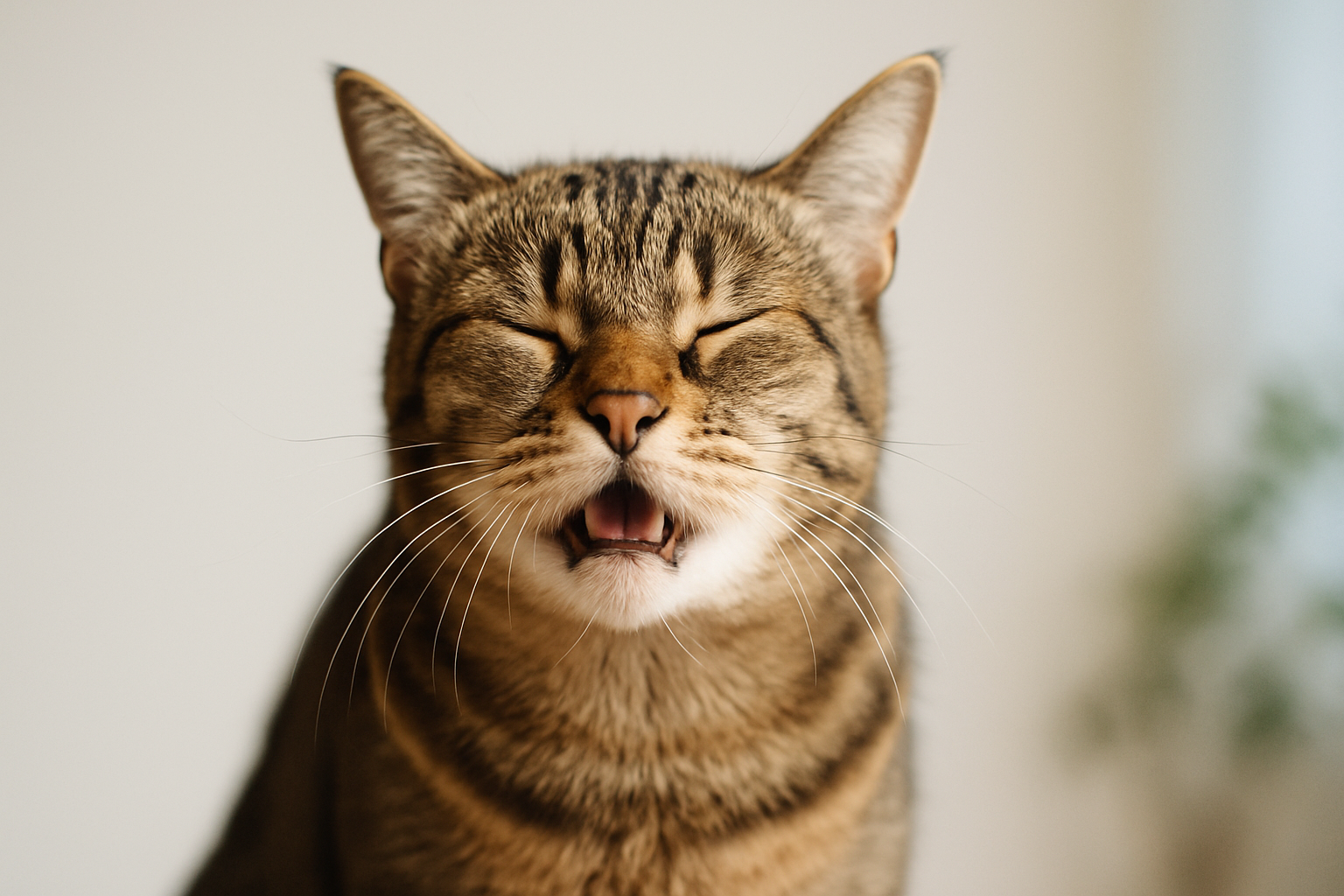Is your cat sneezing more than usual? A single sneeze now and then isn’t a big deal—but if it keeps happening, it might be a sign of something more serious. Just like people, cats can sneeze for harmless reasons like dust or cold air, but frequent or intense sneezing can also point to underlying health issues that shouldn’t be ignored.
In this guide, we’ll walk through why cats sneeze, what different symptoms mean (like sneezing with watery eyes), when to worry, and how to help your kitty feel better—whether it’s a mild case of sniffles or something that needs a vet visit.
Why Is My Cat Sneezing?
There are plenty of reasons your cat might sneeze. Some are totally normal; others could mean a vet visit is in order. Here are the most common causes:
- Environmental irritants: Dust, cigarette smoke, strong perfumes, essential oils, or cleaning products can trigger sneezing.
- Allergies: Cats can be allergic to pollen, mold, dust mites, or even certain foods. Sneezing is a common allergy symptom.
- Viral infections: Like feline herpesvirus or feline calicivirus, especially in kittens or unvaccinated cats.
- Bacterial infections: Secondary infections often follow viral illness and may cause sneezing with yellow or green discharge.
- Dental disease: Infections in the upper teeth can spread to the sinuses and cause sneezing.
- Foreign objects: Bits of grass, dust, or debris can get lodged in the nose.
Why Does My Cat Keep Sneezing?
Occasional sneezing is fine. But if your cat keeps sneezing—especially for several days in a row—there could be a more persistent issue going on:
- Chronic upper respiratory infections: Some cats, especially those from shelters or multi-cat households, may carry viruses like herpesvirus for life, causing recurring symptoms.
- Chronic rhinitis: Ongoing inflammation in the nasal passages can cause frequent sneezing and discharge.
- Nasal polyps or tumors: Though rare, these can block airflow and cause chronic sneezing, especially in older cats.
- Fungal infections: Conditions like aspergillosis may cause prolonged sneezing and nasal discharge.
Cat Sneezing and Watery Eyes: What It Means
If your cat is sneezing and also has watery eyes, it’s often a sign of a viral upper respiratory infection. This is common in kittens and newly adopted cats. It can spread easily through shared bowls, toys, and grooming.
Other signs may include:
- Clear or colored nasal discharge
- Squinting or eye redness
- Pawing at the face or nose
- Reduced appetite or energy
When to Worry About Cat Sneezing
Not all sneezes are equal. Contact your vet if your cat shows any of the following:
- Frequent or violent sneezing that lasts more than a few days
- Thick yellow, green, or bloody nasal discharge
- Labored or noisy breathing
- Loss of appetite or weight
- Lethargy or fever
These symptoms could indicate something more serious, like pneumonia, feline asthma, or an underlying immune disorder.
How to Help a Sneezing Cat at Home
If your cat is sneezing but otherwise seems okay, you can try some simple remedies at home to help them feel better:
- Run a humidifier to ease nasal dryness and congestion
- Let your cat sit in a steamy bathroom for 5–10 minutes
- Wipe discharge with a warm, damp cloth
- Keep litter dust and irritants to a minimum
- Make sure your cat is eating, drinking, and resting well
How Vets Diagnose Chronic or Severe Sneezing
If your cat’s sneezing isn’t going away, your vet might recommend tests like:
- PCR testing: To detect viruses or bacterial infections
- Rhinoscopy: A tiny camera looks inside the nasal passages
- CT scan or X-rays: To rule out tumors or dental problems
Treatment Options: From Lysine to Antibiotics
Treatment depends on the diagnosis. Common options include:
- L-Lysine: A supplement that may reduce herpesvirus flare-ups
- Antibiotics: For secondary bacterial infections
- Antivirals or steroids: For chronic inflammation or viral control
- Surgery: In rare cases for nasal polyps or tumors
Preventing Cat Sneezing
While you can’t prevent all sneezing, you can reduce your cat’s risk:
- Keep vaccinations up to date
- Avoid strong scents and household irritants
- Clean bowls, bedding, and litter boxes regularly
- Use unscented, low-dust litter like Dr. Elsey’s
- Isolate sick cats in multi-cat homes
Frequently Asked Questions
Why does my cat keep sneezing but seems fine?
It could be minor irritation, dust, or mild allergies. If there’s no discharge or other symptoms, monitor at home and use a humidifier to help ease their nose.
Is cat sneezing contagious?
Yes, if caused by viral infections like herpesvirus or calicivirus. These can spread between cats, especially in shared spaces.
When should I take my sneezing cat to the vet?
If sneezing lasts more than a few days or comes with eye discharge, loss of appetite, or lethargy—schedule a vet visit to rule out serious conditions.
Can cats sneeze from allergies?
Absolutely. Common allergens include pollen, dust, mold, smoke, and even scented candles. Sneezing may also come with itching or watery eyes.
Is Cat Sneezing Something to Worry About?
Most of the time, cat sneezing is harmless and goes away on its own. But when it lingers or comes with other symptoms, it’s your cat’s way of telling you they need help. From home remedies to vet care, you have options—and your furry friend will thank you for paying attention to those little ah-choos.



